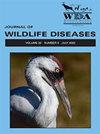Prion Gene Sequencing in Florida Panthers (Puma concolor coryi) Suggests No Differential Susceptibility to Transmissible Spongiform Encephalopathy.
IF 1.1
4区 农林科学
Q3 VETERINARY SCIENCES
引用次数: 0
Abstract
Transmissible spongiform encephalopathy, or prion disease, poses a serious threat to wildlife; however, the susceptibility of apex predators is still being assessed. We investigated variation in the prion protein gene in Florida panthers (Puma concolor coryi) and found that admixture from Central American pumas probably introduced a novel, albeit benign, prion allele.
佛罗里达豹(Puma concolor coryi)的朊病毒基因测序表明其对传染性海绵状脑病的易感性没有差异。
传染性海绵状脑病(或称朊病毒病)对野生动物构成严重威胁;然而,顶级食肉动物的易感性仍在评估之中。我们调查了佛罗里达美洲豹(Puma concolor coryi)的朊病毒蛋白基因变异,发现来自中美洲美洲狮的混杂可能引入了一种新的、尽管是良性的朊病毒等位基因。
本文章由计算机程序翻译,如有差异,请以英文原文为准。
求助全文
约1分钟内获得全文
求助全文
来源期刊

Journal of Wildlife Diseases
农林科学-兽医学
CiteScore
2.70
自引率
0.00%
发文量
213
审稿时长
6-16 weeks
期刊介绍:
The JWD publishes reports of wildlife disease investigations, research papers, brief research notes, case and epizootic reports, review articles, and book reviews. The JWD publishes the results of original research and observations dealing with all aspects of infectious, parasitic, toxic, nutritional, physiologic, developmental and neoplastic diseases, environmental contamination, and other factors impinging on the health and survival of free-living or occasionally captive populations of wild animals, including fish, amphibians, reptiles, birds, and mammals. Papers on zoonoses involving wildlife and on chemical immobilization of wild animals are also published. Manuscripts dealing with surveys and case reports may be published in the Journal provided that they contain significant new information or have significance for better understanding health and disease in wild populations. Authors are encouraged to address the wildlife management implications of their studies, where appropriate.
 求助内容:
求助内容: 应助结果提醒方式:
应助结果提醒方式:


